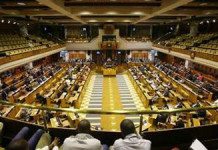
[miningmx.com] — PUBLIC Service and Administration Minister Richard Baloyi admitted on Thursday that the hijacking of black-owned Kalahari Resources created a “perception driven cloud of mistrust on our company registration systems”.
This is the first time a high-ranking government official has publicly commented on the corporate hijacking debacle.
Lawyers and Kalahari Resources have warned that “hijacking” is damaging to South Africa’s reputation.
Speaking at Busa’s second annual anti-corruption forum in Johannesburg, Baloyi added his voice to these concerns.
The minister said the company hijacking, irrespective of whether these are true or false, created a perception driven cloud of mistrust on our company registration systems.
Last month Kalahari Resources founder and chairperson Daphne Mashile-Nkosi found out that she and her fellow director and brother Brian Mashile had been removed as directors of the mining company and unlawfully replaced by eight directors they had never met.
According to Cipro records the new directors included Sandile Majali, as well as Harry Sferopoulous and Stephen Khoza.
Seeking urgent relief from the High Court, Mashile-Nkosi and her brother were reinstated as directors of the company while the court ordered Cipro to remove the names of the eight “new” directors.
Baloyi said in his prepared speech corruption in South Africa had “catastrophic consequences” to the manner in which the country and society was or would be viewed both within and beyond its borders.
The Transparency International 2010 Corruption Perception Index ranks South Africa 54 out of 178 countries.
The Bribe Payers Index, which measures the likelihood of 22 top exporting countries to bribe abroad, ranks South Africa 14 out of 22 countries with a score of 7.5 out of ten.
Baloyi said the emerging pattern out of these indices is that South Africa had a strong input infrastructure to combat corruption, but “societal perception is that we are not performing as our infrastructure allows”.
Corruption had the propensity to collapse an economy in ways that were realised only when the economy had collapsed, he said.
The more salient impact of corruption included private sector distrust of the country’s governance systems; increased cost of international borrowing as a result of perception based ratings that influence investors; and high costs of service delivery in order to accommodate “the hidden costs” of “business facilitation and incentivisation”, Baloyi said.
“As a society we should be worried about corruption as it is the single most threat to good governance,” he said.
“Left unabated, it will develop to a state where access to both public and private services is based on the degree to which you are able to manipulate delivery, even if these are supposed to be freely given.”
Baloyi stressed that measures to fight corruption required partnership between government, business, civil society and the general public.
Government, he said, was establishing a Special-Anti Corruption Unit that will be responsible for investigating corruption cases involving senior managers that are not yet in the formal criminal justice system.











